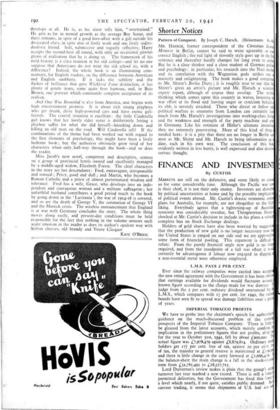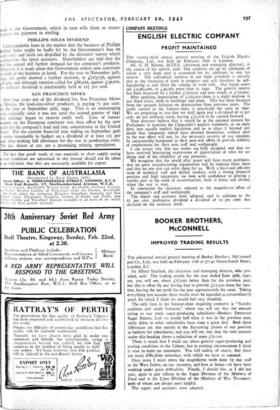FINANCE AND INVESTMEN
By CUSTOS
MARKETS are still on the defensive, and seem likely to re so for some considerable time. Although the Pacific war n is their chief, it is not their only enemy. Investors are distil by political uncertainties at home and by the possible implicau of political events abroad. Mr. Curtin's drastic economic con plans for Australia, for example, are not altogether to the Q liking. Everybody agrees that a tightening-up of Australia economy was considerably overdue, but Throgmorton Street shocked at Mr. Curtin's decision to include in his plans a virtu complete ban on Stock Exchange dealings.
Holders of gold shares have also been worried by suggest that the production of new gold is no longer necessary now the United States is ranged on our side and we are approa some form of financial pooling. This argument is difficult refute. From the purely financial angle new gold is no lo required, and from the standpoint of a full war effort it w certainly be advantageous if labour now engaged in digging a non-essential metal were otherwise employed.
L.M.S. PAYS 2 PER CENT.
Ever since the railway companies were cajoled into acce the new rental agreement with the Government it has been ob that earnings available for dividends would fluctuate around known figure according to the charge made for war damage. judge from the 2 per cent. ordinary dividend announced by L.M.S., which compares with if per cent. for 1940, the rail boards have seen fit to spread war damage liabilities over a Ft of years.
IMPERIAL TOBACCO PROFITS
We have to probe into the chairman's speech for authority guidance on the much-discussed problem of the ea prospects of the Imperial Tobacco Company. There is little be gleaned from the latest accounts, which merely confirm implication in the preliminary figures that net profits, after for the year to October 31st, 1941, fell by about £900,000. actual figure was £7,978,479 against £8,879,814. Ordinary holders get 17} per cent. free of tax, against 20 per cent. of tax, the transfer to general reserve is maintained at £500, and there is little change in the carry forward at £1,666,436. the balance-sheet the main change is a fall in the stock-in- item from £31,781,495 to £28,527,715.
Lord Dulverton's review makes it plain that the group's a turnover last year marked a new record. There is still a lima permitted deliveries, but the Government has fixed this limit a level which nearly, if not quite, satisfies public demand. As current trading, it seems that shipments of U.S. leaf are
e to the Government, which in turn sells them to manu- acturers for payment in sterling.
PHILLIPS SOLES DIVIDEND _
Understandable fears in the market that the business of Phillips ubber Soles might be badly hit by the Government's ban on ape soles and heels are dispelled by the directors' survey which ccompanies the latest accounts. Shareholders are told that the has caused still further demand for- the company's products. loreover, it is made plain that Government orders now constitute he bulk of the business in hand. For the year to November 3oth, 941, net profit showed a further increase, at £113,756, against "87,479, and although taxation called for £68,500, against £39,000, e ordinary dividend- is comfortably held at III per cent.
SAN FRANCISCO MINES
After four years out of the dividend list, San Francisco Mines 1 Mexico, the lead-zinc-silver producer, is paying 71 per cent. or the year to September 30th, 1941. This is an encouraging tart, especially since it was not until the second quarter of 1941 t earnings began to recover really well. Loss of former rkets on the European continent was then offset by the new utlet.for the company's lead and zinc concentrates in the United tates. For the current financial year ending on September 3oth t seems reasonable to budget on a dividend of at least rzf per ant. after making full allowance for the rise in production costs. ,e los. shares at ris. are a promising mining speculation.



























 Previous page
Previous page